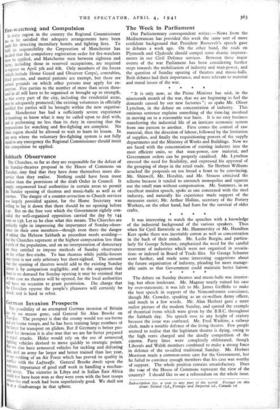Sabbath Observance The Churches, so far as they are responsible
for the defeat of the Sunday-theatres proposal in the House of Commons on Tuesday, may find that they have done themselves more dis- service than they realise. Nothing could have been more modest than the provisions of the draft Order in Council. It simply empowered local authorities in certain areas to permit the Sunday opening of theatres and music-halls as well as of cinemas. The danger of a counter-attraction to Church services was largely provided against, for the Home Secretary was willing to lay it down that there should be no opening before I.3o. But on the free vote which the Government rightly con- ceded the well-organised opposition carried the day by 144 votes to 136. Let us be clear what this means. The Churches are perfectly right in impressing the importance of Sunday-obser- vance on their own members—though even there the danger of taking the Hebrew Sabbath as precedent needs avoiding— but the Churches represent at the highest computation less than a sixth of the population, and on no interpretation of-democracy are they entitled to impose methods of Sunday observance on the other five-sixths. To ban theatres while public-houses may open is not only arbitrary but short-sighted. The amount that the opening of theatres would add to the existing Sunday labour is by comparison negligible, and to the argument that there is no demand for Sunday opening it may be rejoined ,that in that case no theatres will be opened, for the local authorities will have no occasion to grant permission. The charge that the Churches oppose the people's pleasures will certainly be raised, and is hard to rebut.


























 Previous page
Previous page